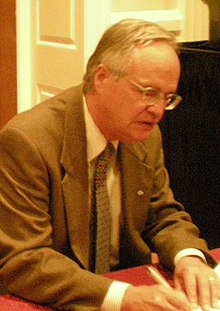|
James Gustave Speth
James Gustave (Gus) Speth (born on March 4, 1942) is an American environmental lawyer and advocate who co-founded the Natural Resources Defense Council. Early life and educationHe was born in Orangeburg, South Carolina in 1942. He graduated summa cum laude from Yale University in 1964, attended Balliol College at the University of Oxford as a Rhodes Scholar and graduated from Yale Law School, where he was a member of St. Anthony Hall and the Yale Law Journal, in 1969.[1] CareerIn 1969 and 1970, Speth served as a law clerk to U.S. Supreme Court Justice Hugo L. Black. He was a co-founder of the Natural Resources Defense Council, where he served as senior attorney from 1970 to 1977. He served from 1977 to 1981 as a member and then for two years as chairman of the Council on Environmental Quality in the Executive Office of the President. As chair, he was a principal adviser on matters affecting the environment and had overall responsibility for developing and coordinating the President's environmental program. In 1981 and 1982, he was a professor of law at Georgetown University Law Center, teaching environmental and constitutional law. Many conservatives considered Speth to be a radical in regards to his approach to environnmetal laws.[2] In 1982, he founded the World Resources Institute,[3] a Washington, D.C.–based environmental think tank, and served as its president until January 1993. He was a senior adviser to President-elect Bill Clinton's transition team, heading the group that examined the U.S.'s role in natural resources, energy and the environment. In 1991, he chaired a U.S. task force on international development and environmental security which produced the report Partnership for Sustainable Development: A New U.S. Agenda. In 1990 he led the Western Hemisphere Dialogue on Environment and Development which produced the report Compact for a New World. From 1993 to 1999, he served as Administrator of the United Nations Development Programme; he served as special coordinator for economic and social affairs under Secretary-General Boutros Boutros-Ghali, managed the United Nations Development Assistance Plan and also served as chair of the United Nations Sustainable Development Group.[4] In 1999, he became the dean of the Yale School of Forestry and Environmental Studies at Yale University, New Haven, Connecticut. He served the school as the Carl W. Knobloch, Jr. Dean and Sara Shallenberger Brown Professor in the Practice of Environmental Policy when he retired from Yale in 2009 to assume a professorship at Vermont Law School in South Royalton, Vermont.[5] Speth was succeeded as Dean at Yale by Sir Peter Crane.[6] In 2014 he published his memoir Angels by the River. In that year, he was also board member of the New Economy Coalition.[7] Speth currently serves on the advisory council of Represent.Us, a nonpartisan anti-corruption organization.[8] Speth has been a leader or participant in many task forces and committees aimed at combating environmental degradation, including the President's Task Force on Global Resources and Environment; the Western Hemisphere Dialogue on Environment and Development; and the National Commission on the Environment.[citation needed] AwardsAmong his awards are the National Wildlife Federation’s Resources Defense Award, the Natural Resources Council of America's Barbara Swain Award of Honor, a 1997 Special Recognition Award from the Society for International Development, the Lifetime Achievement Award of the Environmental Law Institute, and the Blue Planet Prize. He holds honorary degrees from Clark University, the College of the Atlantic, Vermont Law School, Middlebury College, and the University of Massachusetts Boston. PublicationsBooks
Articles
See alsoReferences
External linksWikimedia Commons has media related to James Gustave Speth. Wikiquote has quotations related to James Gustave Speth.
|
||||||||||||||||||||||||||||||||||||
